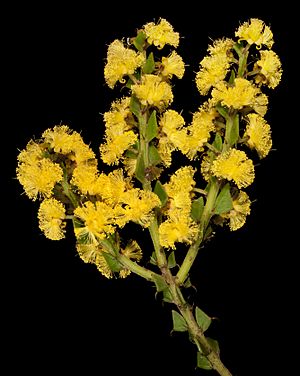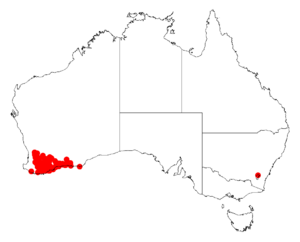Acacia chrysocephala facts for kids
Quick facts for kids Acacia chrysocephala |
|
|---|---|
 |
|
| Scientific classification | |
| Genus: |
Acacia
|
| Species: |
chrysocephala
|
 |
|
| Occurrence data from AVH | |
| Synonyms | |
|
Racosperma chrysocephalum Acacia biflora var. aurea. |
|
Acacia chrysocephala is a type of shrub. It belongs to the large plant group called Acacia. This plant is known for its bright yellow flowers.
Contents
About the Acacia chrysocephala
This shrub is usually dense and compact. It also has small spines. It typically grows to be about 0.2 to 0.6 meters (which is about 8 inches to 2 feet) tall.
Flowers and Leaves
The plant blooms with yellow flowers from May to October. Its leaves are actually not typical leaves. They are called phyllodes. Phyllodes are flattened leaf stalks that look and act like leaves.
These phyllodes are small, usually 3 to 12 millimeters long. That's about 0.1 to 0.5 inches. They are often pointed. The flowers grow in small, round clusters. Each cluster has about two to four flowers.
Seeds and Pods
After the flowers bloom, the plant forms seed pods. These pods are slightly curved. They can grow up to 3 centimeters (about 1.2 inches) long. Inside the pods are shiny brown seeds. The seeds are small, about 1.5 to 10 millimeters long.
How it Was Named
Scientific Name
The Acacia chrysocephala was first officially described in 1978. A botanist named Bruce Maslin gave it its scientific name. He wrote about it in a science journal called Nuytsia.
Other Names
Sometimes, plants are known by other names. For this acacia, some older names include Racosperma chrysocephalum and Acacia biflora var. aurea.
Plant Family
This plant is part of a group called the Acacia biflora group. It is also related to another plant called Acacia incrassata.
Where it Grows
Location in Australia
The Acacia chrysocephala is found in Western Australia. It grows in different regions there. These include the Great Southern, Wheatbelt, and Goldfields-Esperance areas.
Soil and Habitat
This shrub likes to grow in sandy or clay soils. These soils are often found over a type of rock called laterite. You can find it scattered in many places. For example, it grows around York and goes south to the Stirling Range. It also grows east as far as Scaddan.
It lives in different natural areas. These include woodlands with Eucalyptus wandoo trees. It also grows in Eucalyptus marginata forests. Sometimes, you can find it in mallee scrub or low heath communities.

